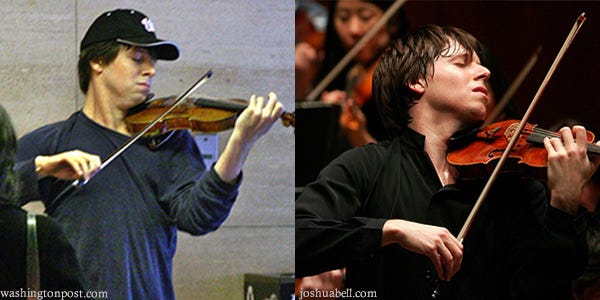The Subway Serenade
How Joshua Bell's Incognito performance reveals our lack of awareness
Hello & welcome to another edition of Beyond Self Improvement!
Last Wednesday, I wrote The Myth of Enlightened Retirement.
We have 12 new subscribers to Beyond Self Improvement since last Wednesday. My goal is 1,000 subscribers by December 2023. If you aren’t already, join 595 lovely people by subscribing right now:
Summary in Three Sentences
Amidst the bustle of New York, even a Grammy-winning violinist like Joshua Bell becomes just another busker, the beauty of his playing largely ignored. It's a startling reminder of how our inattentiveness can blind us to the extraordinary, even when it's right in front of our ears. But with conscious effort, we can train our minds to recognize and appreciate the symphonies of everyday life.
Dear Friends,
In the heart of New York City, a violinist named Joshua Bell once played at a metro station, incognito, in a now well-known social experiment. Thousands walked past him, lost in their daily commutes, oblivious to the Grammy award-winning musician playing a Stradivarius violin just steps away. How could so many fail to recognize, let alone stop to appreciate, such talent and beauty? The answer lies in awareness, or perhaps more accurately, the lack thereof.
It is commonly assumed that our conscious mind knows everything around us. The reality, however, is that as we go about our lives, our minds are usually lost in thought, unaware of our surroundings—external or internal. As such, we often operate on autopilot.
Part of the challenge is that our minds are inundated with stimuli, unable to process all the information. This is not a weakness but rather an evolutionary advantage. It allows us to focus on immediate tasks, threats, or opportunities. But while our brains are designed to filter out the "noise," they often screen out many of life’s most profound moments. Thankfully, we have the ability to cultivate awareness.
𑁍
Awareness is like the silent light of dawn slowly spreading across the horizon, illuminating everything in its path. In our daily lives, this light shows us the way, reveals the beauty around us, and, more importantly, uncovers the depths within us.
Fundamentally, awareness is the deep knowledge of our surroundings, our inner world, and the intricate dance between the two. It's the lens through which we see the world, shaping our responses, choices, and overall life experience. When we're aware, we're attuned to the rhythm of life. We notice the details—the gentle flutter of a hummingbird’s wings, the kindness in another’s eyes, the subtle change in someone's tone.
But awareness isn't just about our external environment. It brings attention to our inner world as well. It helps us to see our thoughts, highlights our emotions, and connects us to our innermost fears and desires. It helps us understand what we are feeling, why we react the way we do, and where these emotions or reactions come from.
"How did the rose ever open its heart and give to this world all its beauty? It felt the encouragement of light against its being. Otherwise, we all remain too frightened.” - Hafiz
𑁍
Imagine a pond. You might see reflections, ripples, and perhaps a few floating leaves on the surface. But beneath the surface lies an entire world—a complex fish, plants, and algae ecosystem. Awareness is the ability to see the surface and what lies beneath. In the context of our minds, it's the capacity to recognize our immediate reactions and explore the underlying beliefs, experiences, and conditioning that drive them.
For spiritual seekers, awareness is the cornerstone of growth and transformation. It's the first step towards understanding the self and the universe. When we're aware, we start recognizing the patterns in our life—the habits that serve us and those that don't, the activities and actions that uplift us, and those that pull us down.
This recognition is powerful. Because once we see these patterns, we can begin changing them. And change, as we discover, is the source of our sorrow and the way of liberation.
However, cultivating awareness in a noisy, distracted, always-on world can be challenging. From the constant pings of our phones to the demands of daily life, much is continually vying for our attention. Amidst this noise, the subtle voice of awareness can easily be lost. But, like a muscle, the more we exercise it, the stronger it gets.
𑁍
So, how does one cultivate awareness? It starts with intention. An intention to be present in this moment. It means actively observing our surroundings and noticing our inner world. It could be as simple as breathing deeply, feeling the air fill our lungs, and slowly leaving our bodies. It could be savoring our favorite tacos on the boardwalk as the sun sets, feeling the texture and taste of each bite. Or it could be sitting in silence for a few minutes daily, observing the thoughts, images, and bodily sensations that arise without judgment.
Over time, as we practice paying attention, our awareness strengthens. Our reactions become more measured, our experiences richer, and our relationships deeper and more satisfying. We start seeing life's impermanent nature—the joys and sorrows, the pains and pleasures, and the unending coming and going of emotions and feelings. And with this understanding comes a profound peace and an unshakeable joy. While we can’t control what happens to us, through awareness, we can choose how we respond to difficulty.
“Good friends, my teaching of the Dharma takes awareness and kindness as its basis. Never say mistakenly that awareness and kindness are different. They are a unity, not two things. Awareness itself is the substance of kindness. Kindness itself is the function of awareness. At the very moment, there is awareness, then kindness exists. Good friends, this means that meditation and kindness are alike. Be careful not to say that meditation gives rise to kindness or that kindness gives rise to meditation. Or that meditation and kindness are different from each other. Awareness and kindness are inherently, by their very nature, the same.” - Hui-Neng, Sixth Zen Patriarch
In this way, awareness is also the path to freedom from suffering. Most of our pain and sorrow stem from clinging—to pleasant experiences, emotions, people, or things. Awareness helps us see where we are clinging. We see how our mind craves pleasurable experiences while shying away from painful ones. And in this recognition lies the power to let go. Letting go doesn't mean apathy or indifference. It means understanding the ever-changing nature of life and choosing to allow things to come and go without clinging or resisting. It is learning to dance with life, to respond creatively to whatever arises.
𑁍
Awareness is our flashlight on the path of life. It shows us the way, revealing the factors of body and sensations, the mind and thinking, the heart and feelings, and the laws that govern life. It holds the promise of spiritual growth, freedom, and transformation. In the wise words of William James, "The faculty of voluntarily bringing back a wandering attention, over and over again, is the very root of judgment, character, and will."
As we navigate the ever-changing waters of life, may we all cultivate and appreciate the gift of awareness, for it truly is the foundation of living an awakened life. And, the next time you find yourself in a bustling metro station or a busy street, take a moment, pause, and truly see. You never know what virtuoso may be playing right beside you.
Live with awareness,
Ryan
When you’re ready, I can help you transform chronic stress and worry into ongoing calm—making you feel in control in 90 days. Schedule a free, 30-minute discovery call today.



